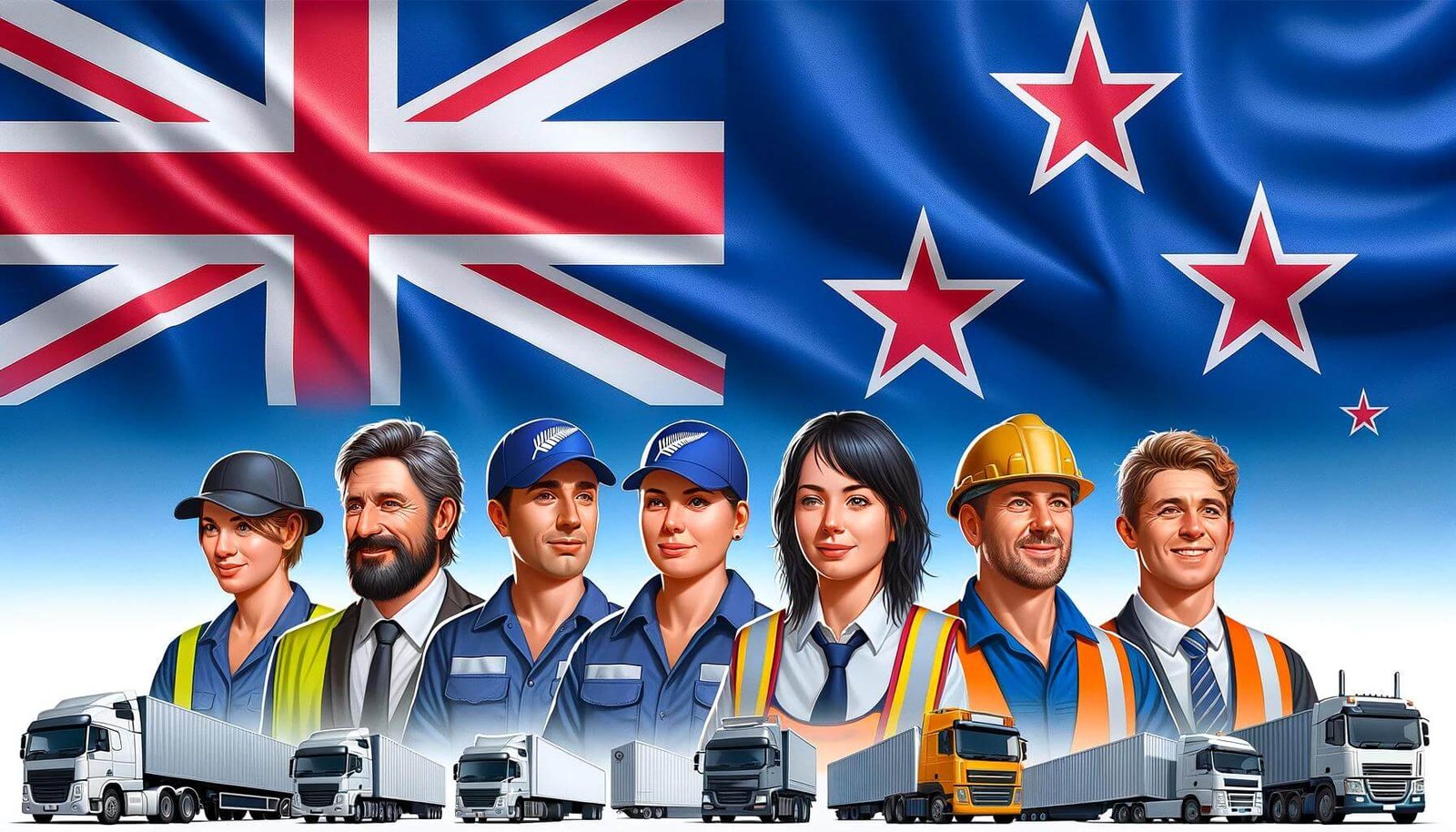The Transport & Logistics industry is vital to New Zealand, ensuring the seamless movement of goods and people. Spanning freight transport, warehousing, and logistics links domestic businesses with global markets and is pivotal for internal distribution.
- Economic Value: Rated as the country’s third-largest sector, it boasts a significant value of USD 17.12 billion, employs over 80,000 individuals, and generates a turnover of NZ$5 billion.
- Growth Forecast: The sector’s market size is projected to expand from USD 17.71 billion in 2024 to USD 20.75 billion by 2029, marking a Compound Annual Growth Rate (CAGR) of 3.21%.
Economic Impact:
- Contribution to GDP: Accounting for about 6% of the nation’s GDP, the Transport & Logistics sector is a cornerstone of economic stability and growth.
- Employment: A key employer, the industry’s job market is on an upward trajectory, mirroring sectoral growth and the need for skilled labour.
- Trade Facilitation: Given New Zealand’s isolation, efficient logistics are crucial for trade, especially for the export of dairy, meat, fruits, and wine. Ports in Auckland and Tauranga play critical roles in handling substantial cargo volumes.
Sector Innovations and Challenges:
- Infrastructure Investments: The government’s heavy investment in roads, rails, and intermodal hubs underscores its commitment to economic expansion and operational efficiency.
- Sustainability Initiatives: A shift towards sustainability is evident, with investments in electric vehicles and drone technology for cleaner, more efficient delivery methods.
- Pandemic Resilience: The COVID-19 crisis tested the industry’s mettle, demonstrating its essential role in the economy and its capacity to adapt and recover, propelled by a surge in online shopping and the demand for swift goods distribution.
1. Courses and Education

The Transport & Logistics sector in New Zealand offers a comprehensive suite of educational programs designed to equip individuals with the knowledge and skills necessary for a successful career in this dynamic industry. Many options are available for aspiring professionals, from diplomas and certificates to advanced degrees and vocational training.
Diploma and Certificate Programs
- Diploma in Logistics & Supply Chain Management: The program typically spans one to two years and provides foundational knowledge in logistics operations, supply chain principles, and management strategies. Graduates are well-prepared for entry-level logistics coordination, inventory management, and procurement positions.
- National Certificate in Freight Forwarding (International): This certificate focuses on international trade and transportation and covers customs brokerage, international shipping regulations, and freight forwarding practices. It’s ideal for those looking to specialize in the global aspects of logistics.
Bachelor’s and Master’s Degree Programs
- Bachelor of Commerce in Supply Chain Management: A three to four-year program that offers in-depth study in supply chain optimization, logistics analytics, and global distribution. This degree prepares students for managerial roles in supply chain and logistics.
- Master of Supply Chain Management: This is an advanced degree for those seeking leadership positions or specialized knowledge in supply chain innovation, sustainability, and strategic management. The program usually requires one to two years of full-time study.
Vocational and Technical Training
- Heavy Vehicle Operation: Vocational training programs focus on the skills required to operate heavy vehicles safely and efficiently. Courses cover vehicle maintenance, safety regulations, and hands-on driving practice, leading to a professional driving qualification.
- Warehouse Operations: Technical training in warehouse operations includes inventory control, warehouse management systems, and safety practices. These programs aim to prepare individuals for roles in warehousing and inventory management.
Online and Continuing Education Options
- Short courses and workshops for professionals: These are designed for ongoing professional development and cover the latest trends in supply chain management, logistics technology, and regulatory compliance. They are ideal for advancing their careers or staying updated with industry changes.
New Zealand is home to several leading institutions that offer quality education in the field of Transport & Logistics:
A few of the ICL partnered Institutes and Universities Offering Relevant Courses in Logistics & Supply Chain are:
Manukau Institute of Technology provides focused diploma and certificate courses in logistics and supply chain management that are directly relevant to the industry. These include:
- Level 4 New Zealand Certificate in International Freight and Logistics, featuring a Freight Forwarding strand
- Level 5 New Zealand Certificate in Supply Chain Management
- Level 5 New Zealand Diploma in International Logistics (Freight Forwarding)
- Level 7 Graduate Diploma in Supply Chain and Shipping Management
Southern Institute of Technology: Provides various logistics and transport training programs.
- Level 3 Certificate in Automotive Engineering with a focus on Heavy vehicles
- Level 3 Certificate in Automotive Engineering, specializing in Light vehicles
- Level 3 Certificate in Automotive Collision Repair and Refinishing
Nelson Marlborough Institute Of Technology (NMIT): Provides a variety of Maritine Course
- Maritime Operations – Skipper Fishing Vessel Unlimited (Level 6)
- Maritime Operations – Mate Fishing Vessel Unlimited (Level 6)
- Diploma in Nautical Science (Level 6)
- Diploma in Marine Engineering Class 3 and Class 4 (Level 6)
- Maritime Operations – Skipper Fishing Vessel Limited (Level 5)
- Maritime Operations – Master <500GT Near Coastal (Level 5)
- Certificate in Marine Engineering Class 5 (Level 4)
- Marine Engineering – STCW Able Seafarer Engine (Level 4)
- Marine Engineering – STCW Able Seafarer Engine (Level 4)
These educational pathways lay the foundation for a robust career in the Transport & Logistics industry, meeting the sector’s need for skilled professionals capable of navigating the complexities of modern supply chains and logistics operations.
2. Careers in Transport & Logistics

The Transport & Logistics sector in New Zealand presents a wide array of career opportunities, driven by its critical role in the economy and the ongoing evolution of global trade and e-commerce. Here’s an exploration of essential roles, emerging trends, necessary skills, and the employment outlook within this vibrant industry.
Overview of Career Opportunities
- Freight and Transport Coordinator: Specializes in coordinating and tracking the movement of goods. Responsibilities include scheduling shipments, liaising with carriers, and ensuring compliance with regulations.
- Logistics Manager: Oversees operations within a supply chain, managing logistics processes, warehouse operations, and transportation strategies to ensure efficient delivery of goods.
- Supply Chain Analyst: This person uses analytical and quantitative methods to understand, predict, and enhance supply chain processes. They focus on inventory levels, supply chain speed, cost analysis, and the performance of supply chain operations.
- Warehouse Manager: This person manages warehouse staff, oversees inventory controls, organizes storage, and ensures the safe and efficient operation of the warehouse.
Emerging Trends and Demand in the Job Market

- The Rise of E-commerce and Its Impact on Logistics: The exponential growth of online shopping has escalated demand for logistics professionals who can manage fast-paced, complex supply chains and deliver exceptional customer service.
Green Logistics and Sustainability Practices: As the world increasingly focuses on sustainable practices, there is a growing demand for professionals adept in eco-friendly logistics strategies, aimed at reducing the environmental footprint of transport and supply chain activities.
Skills and Qualifications Required
- Technical Skills: Proficiency in supply chain management software (e.g., SAP, Oracle SCM), data analysis tools, and logistics-specific technology (RFID, GPS tracking, etc.).
- Certifications: CILT (Chartered Institute of Logistics and Transport) and CPIM (Certified in Production and Inventory Management) are highly regarded.
- Soft Skills: Critical thinking, problem-solving, effective communication, and leadership are essential for success in this sector.
Salary and Employment Outlook
- Freight and Transport Coordinator: The average salary ranges from NZD 45,000 to NZD 65,000 per year, depending on experience and the complexity of the operation.
- Logistics Manager: Salaries for this role typically range from NZD 70,000 to over NZD 100,000 annually, depending on the scale of operations and the specific industry.
- Supply Chain Analysts are expected to earn between NZD 60,000 and NZD 90,000 per year, with higher salaries for those with advanced analytical skills and experience.
- Warehouse Manager: Annual salaries range from NZD 55,000 to NZD 85,000, influenced by the size of the warehouse and the level of responsibility.
- Employment Growth Projections: The Transport & Logistics sector is expected to grow steadily, particularly in e-commerce, sustainability, and technology integration. The demand for skilled professionals in these areas will increase significantly in the next decade.
Licenses or Certifications:
Transport and Logistics Occupations Requiring Specific Licenses or Certifications:
In New Zealand, certain professions within the Transport and Logistics sector may require registration or accreditation, depending on the specific nature of the work.
- Heavy Vehicle Driver Licence: Drivers of heavy vehicles, including trucks and buses, must hold the appropriate class of driver’s license for the vehicles they operate. New Zealand categorizes heavy vehicle licenses into classes 2 through 5, with each class allowing the holder to drive cars of increasing size and complexity. Additional endorsements may be required for transporting dangerous goods or passengers.
- Forklift Operators: Operating a forklift in New Zealand typically requires the operator to hold an F endorsement on their driver’s license and an OSH certificate.
Customs Brokers and Freight Forwarders: Although not mandated to have a formal “registration” in a regulatory context, customs brokers and freight forwarders frequently seek out professional certifications and association memberships. Being part of industry bodies such as the Customs Brokers and Freight Forwarders Federation of New Zealand (CBAFF) can significantly enhance one’s professional standing and career prospects.
Professional Development and Recognition:
- Chartered Institute of Logistics and Transport (CILT): CILT offers membership and professional recognition for logistics and transport professionals, providing a pathway for professional development and networking. Membership can serve as a mark of professionalism and commitment to the industry.
- Industry Certifications: Various certifications are available for logistics and supply chain professionals, including the Certified Logistics Professional (CLP) and Certified Supply Chain Professional (CSCP) designations. These certifications, offered through international bodies, can bolster a professional’s qualifications and recognition in the field.
3. Settlement Opportunities

New Zealand offers a welcoming environment for professionals in the Transport & Logistics sector, with various immigration pathways and a high quality of life. Here’s a comprehensive overview of settlement opportunities, including work visas, lifestyle insights, and community networks.
Work Visas and Immigration Pathways for Professionals
- Essential Skills Work Visa: This visa is designed for individuals who have been offered a full-time job in New Zealand and possess the necessary skills and qualifications for the role. It’s particularly relevant for skilled workers in the Transport & Logistics industry, where there’s a demand for specific expertise.
- Skilled Migrant Category Resident Visa: Aimed at skilled workers who wish to reside permanently in New Zealand, this points-based visa considers factors like age, work experience, qualifications, and an offer of skilled employment. It’s an attractive pathway for professionals looking to move to New Zealand.
Transport Sector Agreement and Green List Changes
- Transport Sector Agreement Finalized: As confirmed by the Minister of Immigration and Transport on 26 April 2023, this agreement introduces a 2-year work-to-residence pathway for specific roles within the transport sector, including truck and bus drivers, and has been extended to encompass critical maritime transport roles. This initiative supports vital national infrastructure by improving New Zealanders’ pay, conditions, and training opportunities.
- Median Wage Exemption for Bus Drivers: Effective immediately, employers hiring bus drivers for roles that are either part of the All Parties Memorandum of Understanding on Improving Bus Driver Pay and Conditions or as a school bus driver on a Ministry of Education-funded school bus service will be eligible for a median wage exemption set at $28 an hour. These roles are eligible for the Accredited Employer Work Visas (AEWV) for 3 years, allowing enough time for workers to complete the required 2 years of work in New Zealand to apply for residence.
- Green List Additions: Significant to the transport sector, specific occupations will be added to the ‘Straight to Residence’ Green List pathway on 29 May 2023, aiming to address labour shortages and offer greater certainty to businesses.
AEWV Roles Exempt from Paying the Median Wage:
- Bus drivers in eligible roles
- Truck drivers primarily drive vehicles requiring a class 4 or 5 licence.
- Ship’s masters (skippers) with Skipper Restricted Limits for 500GT endorsement or higher
- Deckhands holding Qualified Deck Crew qualification or higher.
Living in New Zealand
- Cost of Living and Lifestyle: New Zealand is known for its high quality of life, with a balance between work and leisure that residents highly value. The cost of living varies by city, with Auckland, Wellington, and Christchurch as major urban centres. Expenses include housing, transportation, healthcare, and education.
- Major Cities for Transport & Logistics Careers:
- Auckland: As New Zealand’s largest city and central central transport hub, Auckland offers numerous opportunities in logistics, freight forwarding, and supply chain management.
- Christchurch: Known for its export-oriented economy, Christchurch has a strong demand for professionals in freight and transport coordination, particularly related to agriculture and manufacturing.
- Wellington: While smaller, Wellington’s strategic location and focus on innovation offer unique opportunities in logistics planning and green logistics solutions.
Community and Professional Networks
- Industry Associations and Professional Networking Groups:
- Customs Brokers and Freight Forwarders Federation of New Zealand (CBAFF): Offers networking opportunities, training, and industry updates.
- Supply Chain & Logistics Association of New Zealand (SCLAA): This professional association provides members access to industry events, workshops, and professional development resources.
- Chartered Institute of Logistics and Transport (CILT): This organization offers a platform for professional recognition, networking, and continuous learning in the transport and logistics sector.
Success Stories
- Case Studies of Immigrants Who Have Successfully Settled in New Zealand Through Careers in Transport & Logistics:
- Many immigrants have leveraged their logistics and supply chain management skills to establish successful careers in New Zealand. For instance, individuals from countries with significant export industries often find their experience in demand, especially in freight forwarding and logistics coordination roles.
- Success stories often highlight the importance of networking, continuous professional development, and adapting to the New Zealand workplace culture. The supportive community and professional networks play a crucial role in helping immigrants settle and thrive in their new environment.
Conclusion
The Transport & Logistics industry is an indispensable pillar of New Zealand’s economy, offering vital connectivity and efficiency that propel national and international trade. With its broad career opportunities, from operational roles to strategic management positions, the sector is a critical driver of economic growth and sustainability.
Recap of the Importance of the Transport & Logistics Industry to New Zealand
- Economic Contribution: The Transport & Logistics sector significantly impacts New Zealand’s GDP, showcasing its importance in enhancing its economic resilience and global competitiveness.
- Employment Opportunities: As a major employer, the industry provides numerous jobs across various functions, contributing to employment growth and workforce development.
- Innovation and Sustainability: With a focus on green logistics and technological advancements, the sector is at the forefront of adopting sustainable practices, ensuring New Zealand’s future readiness in a global landscape.
Final Thoughts on Pursuing Education, Career, and Settlement in This Sector
Choosing a career in the Transport & Logistics industry offers a reliable and fulfilling career trajectory, alongside the chance to support the nation’s economic and environmental objectives. With various educational courses and career options available, along with favourable government policies and opportunities for settling, this sector stands out as an appealing choice for talent from both within the country and abroad.
For those looking to build a future in New Zealand, the Transport & Logistics sector offers a dynamic environment where skills are in demand, innovation is embraced, and sustainable practices are prioritized. Whether starting with educational pursuits or directly entering the workforce, individuals have the chance to grow, innovate, and lead in an industry that is fundamental to the nation’s success.
Additional Resources
To further explore opportunities and gather more information about the Transport & Logistics sector in New Zealand, consider the following resources:
- New Zealand Immigration: https://www.immigration.govt.nz/
- New Zealand Qualifications Authority (NZQA): https://www2.nzqa.govt.nz/ – For information on accredited courses, qualifications, and training providers in the Transport & Logistics sector. NZQA
- Chartered Institute of Logistics and Transport (CILT) New Zealand: https://cilt.co.nz/ – For professional development, networking opportunities, and industry insights. CILT NZ
- Customs Brokers and Freight Forwarders Federation of New Zealand (CBAFF):https://www.cbaff.org.nz/ – For updates on industry standards, training, and events relevant to freight forwarding and customs brokerage. CBAFF
As the Transport & Logistics industry evolves, staying informed and connected through these resources can significantly enhance your educational journey, career prospects, and settlement experience in New Zealand.














